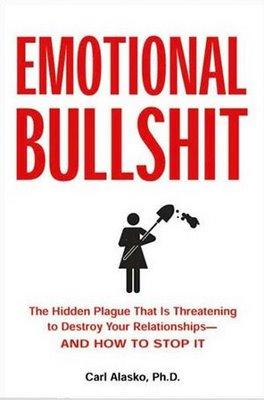Emotional Bullshit: The Hidden Plague That Is Threatening to Destroy Your Relationships—And How to Stop It

Emotional bullshit, however far flung, rarely consists of strategies for conflict aversion. Carl Alasko’s Emotional Bullshit: The Hidden Plague that Is Threatening to Destroy Your Relationships—And How to Stop It consists of strategies for identifying and replacing those habits. Denial, delusion, and blame sneak into our repertoire, to make us look or feel better about our job, our part in a relationship, or role in our family, how far we’ve digressed from our goals and integrity, or keeping promises, to ourselves and others. In some it is tastelessly obvious, in others it is virtually undetected, at least for a while.
Alasko describes three common habits: denial, delusion and blame as a self-camouflaging sequence, in addition to that pesky, prickly good feeling we get from serotonin when we’re in love can help us get hooked on delusions about a relationship, even when we at first see bad signs. Like any good self-help book, it makes a lot of sense, and yet it is original and interesting.
My eager endorsement of the book may be self-incriminating; allow me to follow a genre approach to elucidate: Do you often spend time, energy or other resources avoiding conflict? Do you rationalize your own or others behavior? Following a confrontation do you have thoughts about how right or how much better you are? Are you often lonely or are you usually in relationships that are parasitic or filled with strife? In short, anyone who has strife in a relationship of any kind could theoretically benefit.
There are a couple strategies on how to deal immediately with conflict, even if you are in a position where you cannot respond, or are incapacitated to respond well. And there are more complex strategies for engaging in ongoing discussion with someone you have an intimate relationship with and are committed to. These are "fool proof if you follow all the steps/rules." Realistically, I can imagine very many alternate "out of bounds" responses and outcomes for every case study that went well.
To the author's credit, attempts one, two and three to getting it right are often described. Some of the couples' true stories are very moving. I can't help but think that they benefited particularly by having the author as their therapist, and that undertaking the strategy, however simple, as "amateurs" and without a neutral, and professional, mediator, could take a lot more tries. Still, better self-awareness, at least, can be achieved by reading Emotional Bullshit: The Hidden Plague that Is Threatening to Destroy Your Relationships—And How to Stop It.